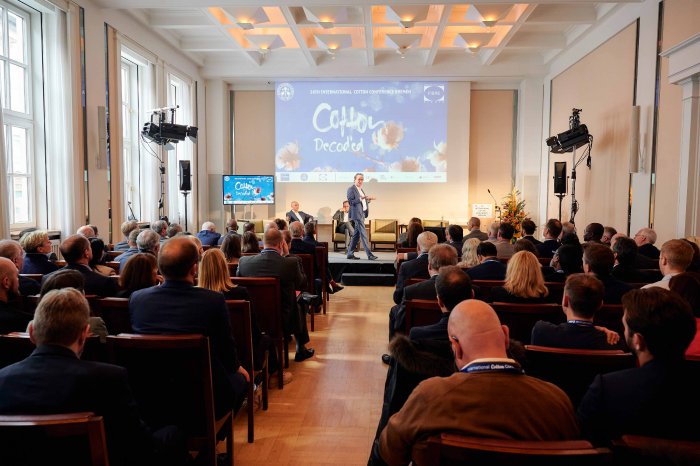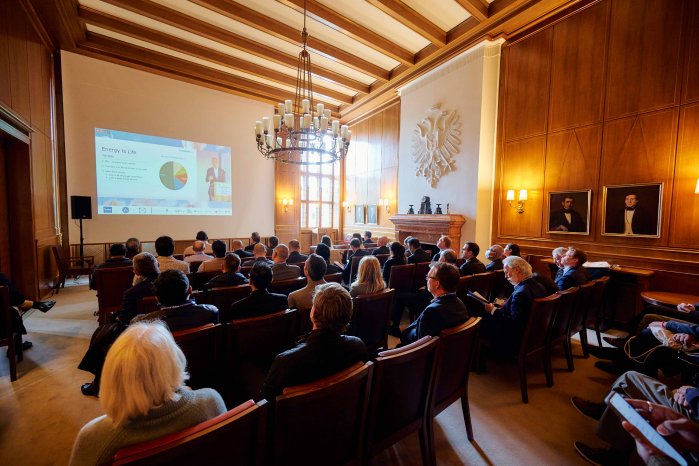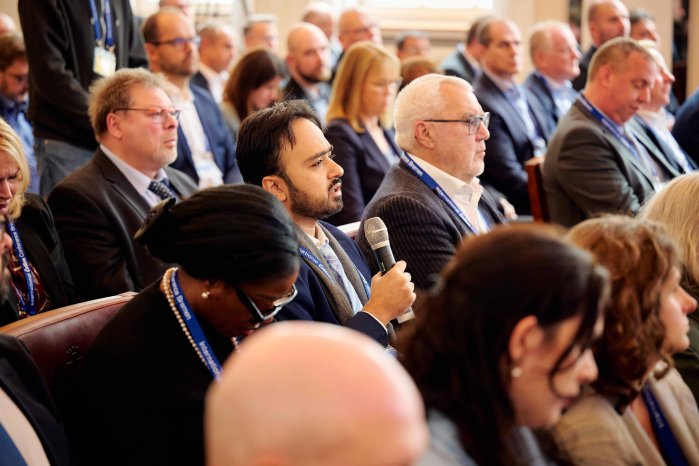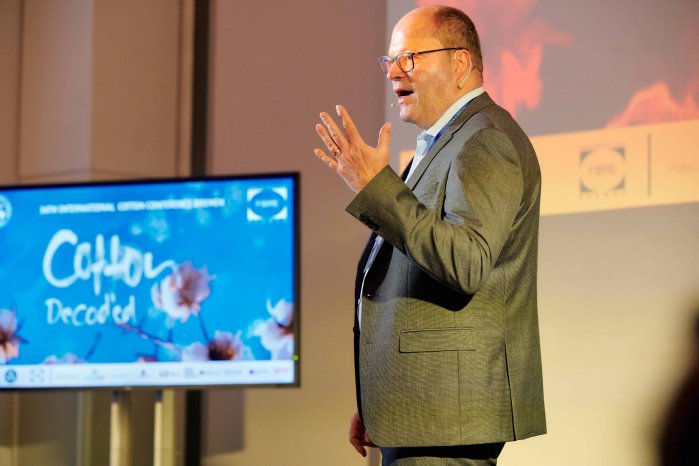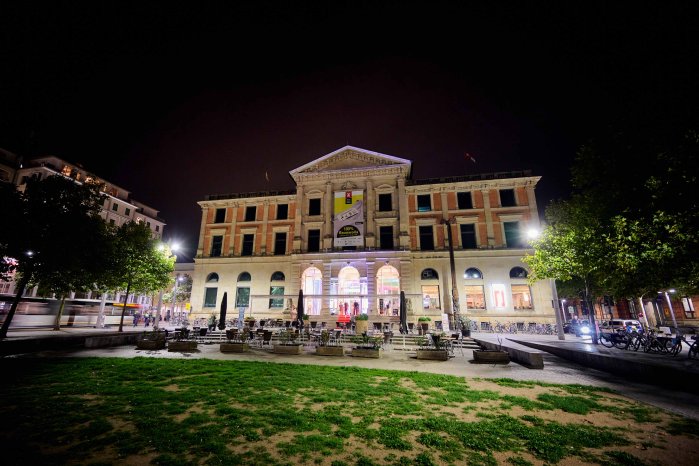“We can be proud of the result of our recent International Cotton Conference. It was accompanied this time by the celebrations of the 150 th birthday and, as another highlight, a cotton exhibition at the Bremen Übersee-Museum. The conference originated from a meeting of laboratory managers for cotton quality testing in 1965 and has now developed into an important exchange platform for participants from the entire textile supply chain,” emphasises Stephanie Silber, President of the Bremen Cotton Exchange and Managing Director of the cotton trading company Otto Stadtlander GmbH.
“The joint planning and implementation of the International Cotton Conference by the Bremen Fibre Institute and the Bremen Cotton Exchange has always been an example of how science and practice can complement and benefit from each other. This becomes clear once more in the compilation of the conference programme and the many expert meetings on the fringes of the conference,” says Prof. Dr. Axel Herrmann for the Bremen Fibre Institute (FIBRE).
The Conference Location
This time, the venue of the 36th International Cotton Conference Bremen was listed building of the Bremen Chamber of Commerce directly on the market square and in the vicinity of the Cotton Exchange. The Chamber of Commerce has represented the interests of Bremen´s trade since 1451, to which the Bremen Cotton Exchange Association has belonged since its foundation in 1872.
The Programme
The International Cotton Conference was opened on the morning of September 29 with speeches by Stephanie Silber, President of the Bremen Cotton Exchange, by Prof. Dr. Axel Herrmann, Director of the Bremen Fibre Institute, and by the host, Eduard Dubbers-Albrecht, President of the Bremen Chamber of Commerce.
The programme of the International Cotton Conference consisted sessions with presentations in attendance as well as sessions that were performed exclusively online. Almost 70 speakers added to the success of the conference with their contributions.
Each conference day started with keynotes in which personalities from the branch critically addressed challenges within the world economy and politics. They dealt with trends on the raw materials markets and with questions about the currently much discussed shortages in logistics, but also with the situation on the financial markets.
The speakers included Colin Iles, Executive Manager, Cotton & Sugar at the internationally operating commodities trader Glencore/Viterra, Nils Haupt, Head of Communications at Hapag-Lloyd AG, John Baffes, commodities expert at the World Bank, D.C., and Jörg de Vries-Hippen, Chief Investment Officer and member of the European Executive Committee of Alliance Global Investors.
Sustainability and Climate Protection
In the field of climate protection, the ability of the cotton plant to store carbon in the soil in a climate-neutral manner played a special role. The session illustrated the methods used in agriculture to improve the storage of carbon in the soil and the legal framework that enables the financing of investments in these methods. Life cycle assessment methods play an important role here in order to show the entire carbon footprint over the life of the product from the field to its disposal.
Circular Economy, Transparency and Traceability, Cotton Quality
In addition, the conference dealt with processes of the circular economy, in which modern methods of textile recycling were the focus. The biodegradability of cotton also played a key role once more. The conference addressed questions of transparency and traceability within the supply chain and presented efficient, digitally managed control methods, e.g. by means of distributed ledger technology. Using isotope analysis, it could soon be possible to trace the origin of a cotton fibre harvested from the field back to a finished textile.
Innovative Products Made of Cotton
The discussion about new and innovative ways of processing cotton set new accents. It also addressed the need to advance supply chain technology in the apparel industry with digital design programmes for selecting cotton fabrics using 3D views. Also worth mentioning is the presentation by the internationally renowned Italian denim weaver Candiani, who has developed a blend of cotton and natural rubber yarns in his denim fabrics to create a stretch effect. The jeans fabrics produced this way are 100 percent biodegradable. To date, for this purpose elastane made of man-made fibres has primarily been used in fabrics.
In Focus: EU Cotton Textile Industry and Clothing Retail
A special feature: on Friday, September 30, the conference highlighted the top quality cotton production within the European Union in the network of the highly specialised downstream textile and clothing industry under the headline “Region in Focus”. During the online session, the opportunities for a stronger positioning and assertiveness of the sector in international competition were shown and discussed.
The total of 13 poster presentations also offered valuable additional inspiration, which increased the added value for the conference participants in Bremen. The posters usefully informed the visitors about relevant topics of the cotton economy sector.
Reason to Celebrate: 150 years of Bremen Cotton Exchange in the Conference Year
On September 24, 1872, 12 Bremen cotton traders decided to found the Bremen Cotton Exchange. Consequently, the Bremen Cotton Exchange can celebrate its 150th birthday this year. To set the mood for the anniversary, a book entitled ”150 Years of the Bremen Cotton Exchange – Cotton, Our World Since 1872” was already published in May this year, which illustrates the tasks of the association in the past, present and future and its position in the international market. On the evening of September 29, the Bremen Cotton Exchange invited to an anniversary party in the Bremen Übersee-Museum. The celebrations did not take place here without reason: At the same time, a large cotton exhibition entitled “100% Cotton” on the cultural history of the raw material was opened.
Sessions still online
All sessions of the conference were recorded and are accessible on the talque platform. Every participant in the conference – regardless of whether they attended in person or online – has got access and can use the platform to look up missed sessions and to contact speakers or participants. The presentations provided by the speakers will soon be available on the website of the Bremen Cotton Exchange.
We report continuously and extensively on the International Cotton Conference in our media, such as the Bremen Cotton Report, the websites of Bremen Cotton Exchange and Fibre Institute, and via the social media channels Facebook, LinkedIn and Instagram. News and programme details are still available on the conference website: https://cotton-conference-bremen.de/....
We look forward to active reporting and are happy to support press representatives in selecting suitable discussion and interview partners. Inquiries will be processed as quickly as possible.
The 37th International Cotton Conference Bremen will take place in March 2024. The exact date is still to be announced.
About the Fibre Institute Bremen e. V. (FIBRE)
- In its 66-years history, the Institute has developed from a cotton testing laboratory into a successful research institute in the fields of future-oriented fibres, technical textiles and fibre composites at the University of Bremen. It deals with basic scientific and application-oriented questions along the entire process chain from fibre production to the manufacturing of fibre composite components and more for the aircraft industry.
- FIBRE’s central international importance in cotton is shown by its work on the international harmonisation of cotton testing [e.g. round tests in cooperation with the ICAC and USDA-AMS], its work in central committees [ICAC Committee on Standardised Instrument Testing of Cotton (CSITC), ITMF Cotton Testing
